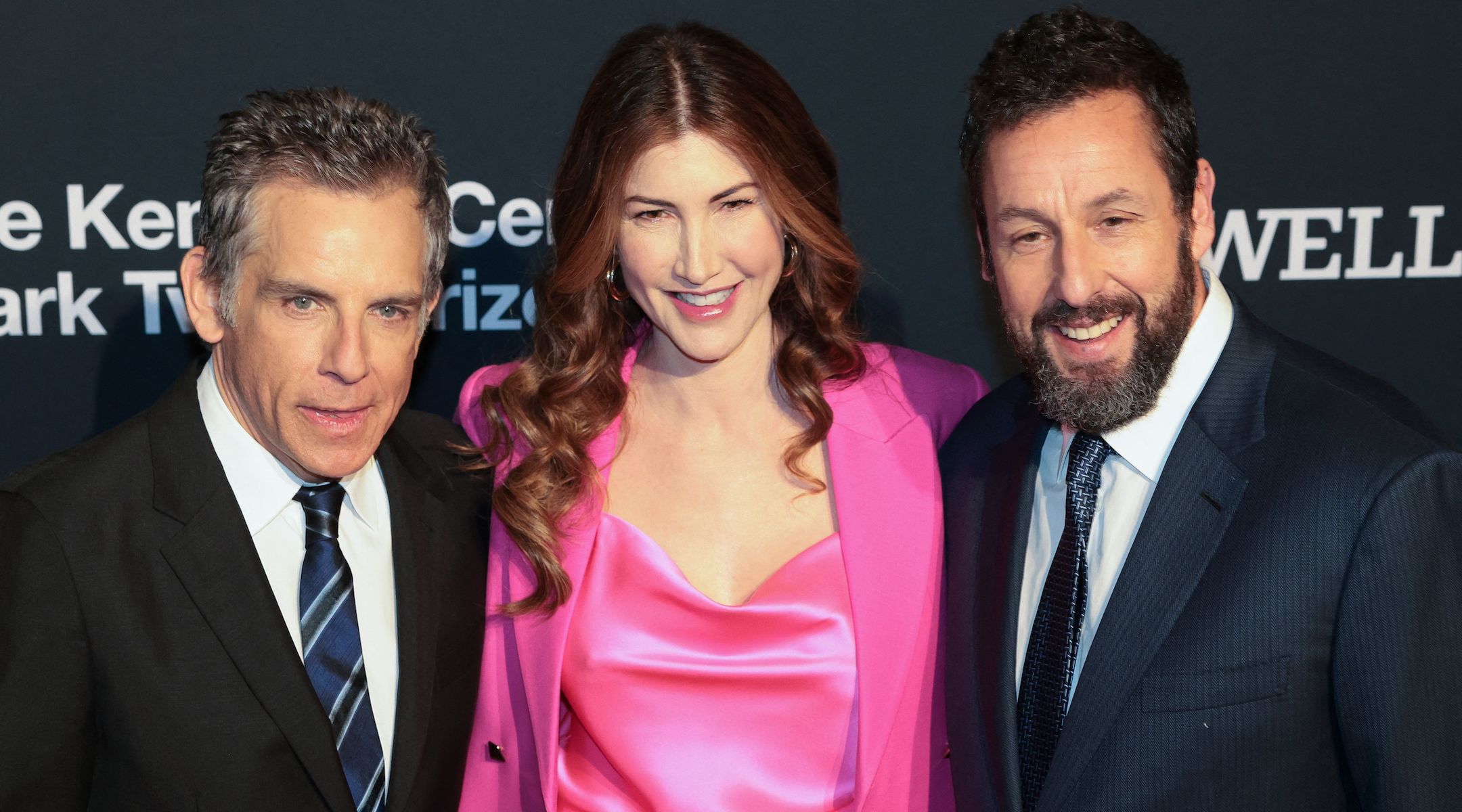Ben Stiller satirizes Adam Sandler’s ‘Chanukah Song’ at Mark Twain Prize ceremony
Sandler earns this year’s prize in American humor for his ‘films, music, and his tenure as a fan favorite’ one ‘Saturday Night Live’

Adam Sandler, far right, and his wife Jackie Sandler pose with actor Ben Stiller as they arrive for the 24th Annual Mark Twain Prize for American Humor at the John F. Kennedy Center for the Performing Arts in Washington, DC, on March 19, 2023. (Oliver Contreras/AFP)
(JTA) — Ben Stiller offered his own High Holiday alternative to Adam Sandler’s “Chanukah Song” as his fellow Jewish comedian accepted the Mark Twain Prize for American Humor.
During an awards ceremony that took place on March 19 and aired last night on CNN, Stiller asked from the stage at Washington, D.C.’s Kennedy Center for the Performing Arts how Sandler’s novelty song, first heard on “Saturday Night Live” in 1994, became a seasonal standard.
“It’s really just a list of rhyming celebrity names, and yet it goes multiplatinum and it’s become a holiday radio staple that my daughter forces us all to listen to after we light the candles every year,” said Stiller.
Pretending to be baffled by Sandler’s success, Stiller imagined what his own representatives would have said had he proposed his own song about Yom Kippur. He then went ahead and sang its “killer opening line,” which included a reference to a notorious slapstick scene in Stiller’s 1998 film “There’s Something About Mary”: “It’s time to atone / So let’s get in the zone. / Got my d–k caught in my zipper / and now it is Yom Kippur.”
It wasn’t the only Jewish moment in a night dedicated to a comedian who, in the course of a tenure on “Saturday Night Live” from 1991-1995 and more than 30 films since, has often displayed his own Jewishness, including playing an Israeli in “Don’t Mess with the Zohan” and starring in what may be the first and only big-budget Hanukkah animated film, “Eight Crazy Nights.”
Fellow comic Chris Rock told a lovely story about meeting Sandler when they were both struggling comics. Rock, who was among just a handful of Black kids at his Brooklyn elementary school, spoke about the one time he was invited to another kid’s house to play. The boy’s name was “David Moskowitz — a Jew,” Rock said, with evident admiration.
Years later, after their sets at a Manhattan comedy club, Sandler invited Rock to hang out with Sandler and his friends at his New York University dorm. Rock said the invitation meant a lot to him as a kid who often felt left out. “The Jews — they’re just nice,” he said.
Although the typical Sandler character is an often crude and frequently angry man-child, his generosity to fellow comics and actors was a recurring theme of the evening, which included presentations by Jennifer Aniston, Drew Barrymore, Steve Buscemi, Luis Guzmán, Conan O’Brien and David Spade. His longtime collaborator Tim Herlihy called him a “mensch.”
Sandler’s mother, Judy Sandler, got in a dig about her son’s penchant for wearing baggy sweat pants and T-shirts despite the billions of dollars his films have grossed. “He’s a fashionista, they say, but I say he’s a slob,” she said.
In choosing Sandler, 56, for the prize, named for the 19th-century writer and humorist, Kennedy Center President Deborah F. Rutter said Sandler has “entertained audiences for over three decades with his films, music and his tenure as a fan favorite cast member on SNL. Adam has created characters that have made us laugh, cry and cry from laughing.”
Previous Jewish winners of the award include Carl Reiner, Lorne Michaels, Neil Simon, Billy Crystal and Jon Stewart. The 2019 prize went to Dave Chappelle, who last year angered many Jewish viewers with a monologue on “Saturday Night Live” making light of antisemitism accusations against rapper Kanye West and basketball star Kyrie Irving.
This article originally appeared on JTA.org.





















